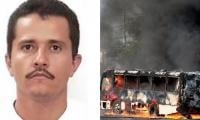A break with the past
Prime Minister Nawaz Sharif hit the nail on the head when in his address at an event to mark the Hindu festival of Holi, he denounced a forced change of religion and underlined the need for complete religious freedom to all communities in accordance with the vision of the country’s founder.
Some time back, at a ceremony organised by the Christian community, PM Sharif had stated that he was the prime minister of all religious communities and not just Muslims. Such speeches make it abundantly clear that Sharif has disassociated himself completely from the legacy of his erstwhile mentor, General Ziaul Haq.
The edifice of Zia’s legacy rests on two pillars: disdain for democracy (political legacy) and religionisation of politics (social legacy). The general had toppled a popularly-elected government and made no bones about his distrust of democracy. His preferred form of government – which he actually put in place – was untrammelled despotism. To impart to it a veneer of credibility, he convened a nominated consultative assembly called the Majlis-e-Shura. He looked upon the constitution as no more than a piece of paper that could be torn asunder at one’s convenience.
In 1985, when the general was forced to hold national elections and restore the fundamental law of the land, he made sure, through constitutional amendments, that under the new arrangement, elected institutions were completely under the thumb of the establishment – which he himself presided over. But even that weak civilian setup was anathema to him and he duly sent it packing in three years.
Zia used religion to legitimise his otherwise illegitimate regime. Soon after coming into power, he set out to establish an Islamic state – as per his own interpretation of the term. He accordingly made significant changes to the legal and political systems. The Islamisation campaign created deep divisions in society. It widened the chasm between Muslims and non-Muslims, and between Shias and Sunnis. It was with the blessings of the government that the country’s most notorious sectarian outfit was born.
The Zia regime also fully cashed in on the 1979 Soviet invasion of Afghanistan. The people of Pakistan were made to believe that the Soviet invasion of Afghanistan had endangered Islam and, therefore, it was the religious duty of the government and the people to fight in the war on the side of America – which was said to be fighting for Islam. It was during the Zia era that the jihadi narrative gained currency.
As a politician, Nawaz Sharif was mentored by Ziaul Haq who made Nawaz Sharif Punjab’s chief minister in 1985 and thus set the stage for his rise to the country’s most powerful office. On his part, Sharif would pride himself on being the heir to his mentor’s legacy.
As a rule, a politician plays a longer innings than a general or a bureaucrat. Sensing that he had far-reaching stakes in the democratic process, Sharif began to distance himself from Zia’s legacy. His electoral triumphs – which established him as a leader in his own right – made it easier for him to secure his future in democracy rather than under a military dictatorship.
By a twist of fate, Sharif was ousted by a general in October 1999, which made him make a complete break with Zia’s political legacy. Interestingly, Z A Bhutto, the nation’s most powerful icon of democracy, also started his political career under the wings of a military dictator but then went about successfully challenging his mentor. This is hardly surprising. Societies and civilisations undergo transition and transformation and so do men and women. The staunchest of supporters of despotism can also change into the most vehement of advocates of democracy.
Making a departure from the social legacy of Zia has been a far more difficult proposition for Sharif – and understandably so. Religious parties have been strong allies of the PML-N. The PML-N took part in the first two post-Zia national elections (1988 and 1990) under the banner of the Islami Jamhoori Ittehad (IJI). During those years when he was fighting a tremendously popular Benazir Bhutto, Nawaz Sharif relied heavily on a substantial religious vote bank. In fact, Benazir was sharply criticised by her opponents for being ‘Westernised’ and ‘secular’ – the two terms that, in popular imagination, were synonymous with being immoral.
In the two subsequent elections as well, when the political adversaries were the same, the PML-N continued to make an appeal to the religious vote bank. During his second stint in power (1997-99), Sharif made an abortive attempt to have the constitution amended with a view to enforcing Shariah in the country.
After 1999, two major developments took place which may have contributed to Sharif’s change of heart. One, the system of separate electorate for the minorities was abolished, paving the way for the political mainstreaming of non-Muslim communities. Although dominant values in society still make it difficult for candidates from minority groups to have adequate representation in the assemblies, there is no constitutional bar on non-Muslims to compete on general seats.
Two, it is being increasingly acknowledged that religious extremism is posing an existential threat to the country and that the pro-militancy narrative rooted in the social legacy of Zia needs to be effectively countered. Rich experience, if nothing else, may have impressed upon Sharif the need to send out the message that it does not expect a popularly-elected government to discriminate on the basis of creed.
In order to enable minorities to exercise religious freedom, other civil liberties as well as combat religious extremism, the relationship between state and religion needs to be re-examined. Such a relationship entails primarily making political as well as economic and cultural institutions instruments to propagate and enforce a particular creed. The logical outcome is that the state is seen as an ideological entity that exists solely to serve a religious purpose.
In the past, the state in Pakistan entrusted itself with making people good Muslims. But who is a good Muslim? Is he or she someone who prays five times a day but who has no qualms about killing those who do not measure up to his ethical and religious standards? Is he or she someone who earns his or her living through hard work? Or is it someone who is compassionate and kind to his fellows irrespective of their creed?
More than 97 percent of Pakistanis are Muslims, who occupy the key slots in the government, and in the business and industrial sectors. Islam has, therefore, never been in danger in Pakistan. But extremism, coming from Muslims, and not non-Muslims, has pushed society to the brink of a disaster.
The writer is a freelance countributor. Email: hussainhzaidi@gmail.com
-
 Can App Stores Really Keep Kids Off Social Media? Here’s What Experts Says
Can App Stores Really Keep Kids Off Social Media? Here’s What Experts Says -
 Margot Robbie Fears Being Dubbed A 'dumb Blonde' Due To Major Reasons: 'Hates The Idea'
Margot Robbie Fears Being Dubbed A 'dumb Blonde' Due To Major Reasons: 'Hates The Idea' -
 How Kate Middleton's Hyperemesis Gravidarum Left Her 'not The Happiest'
How Kate Middleton's Hyperemesis Gravidarum Left Her 'not The Happiest' -
 USA Beats Canada For First Olympic Hockey Gold In 46 Years; Donald Trump, Barack Obama & Others Hail Historic Victory
USA Beats Canada For First Olympic Hockey Gold In 46 Years; Donald Trump, Barack Obama & Others Hail Historic Victory -
 Claressa Shields Defeats Franchon Crews-Dezurn In Heavyweight Title Rematch
Claressa Shields Defeats Franchon Crews-Dezurn In Heavyweight Title Rematch -
 Sam Altman Calls Elon Musk’s Space Data Center Plan ‘ridiculous’
Sam Altman Calls Elon Musk’s Space Data Center Plan ‘ridiculous’ -
 Kara Braxton, WNBA All-Star And Champion, Dies At 43
Kara Braxton, WNBA All-Star And Champion, Dies At 43 -
 Anthropic Lead Engineer Predicts ‘software Engineer’ Role Can Disappear By 2026
Anthropic Lead Engineer Predicts ‘software Engineer’ Role Can Disappear By 2026 -
 Sharon Details Late Husband Ozzy's Final Days During His Sickness
Sharon Details Late Husband Ozzy's Final Days During His Sickness -
 Magic Vs Clippers: Clippers Announce Kawhi Leonard Status After Exit
Magic Vs Clippers: Clippers Announce Kawhi Leonard Status After Exit -
 BTC Price Today: Bitcoin Sinks Below $65K On Trade Uncertainty
BTC Price Today: Bitcoin Sinks Below $65K On Trade Uncertainty -
 'A Knight Of The Seven Kingdoms': All You Need To Know About The Finale
'A Knight Of The Seven Kingdoms': All You Need To Know About The Finale -
 NYC Travel Ban: Mamdani Shuts Down Roads Amid Blizzard Conditions
NYC Travel Ban: Mamdani Shuts Down Roads Amid Blizzard Conditions -
 Alicia Keys Celebrates 25 Years Of Breakout Single ‘Fallin’’
Alicia Keys Celebrates 25 Years Of Breakout Single ‘Fallin’’ -
 Akinola Davies Jr. Gives His Immigrant Parents A Shoutout In 2026 BAFTAs Acceptance Speech
Akinola Davies Jr. Gives His Immigrant Parents A Shoutout In 2026 BAFTAs Acceptance Speech -
 Princess Beatrice, Eugenie Told 'first Thing They Should Do' After Andrew Arrest
Princess Beatrice, Eugenie Told 'first Thing They Should Do' After Andrew Arrest



